A surgery rotation is critical to your PA school education. For many people, their surgery rotation experience is their first time in the operating room and their first glimpse at this side of medical care.
Additionally, I think that surgery rotation experience is really variable between students, PA school programs, and hospitals. I found that the most distinctly different rotations between me and my fellow students were our surgery rotations. It really depends if you are on general surgery the entire time or rotated through different surgical specialties during your rotation. The hospital size and set-up can really determine the experience you have in your surgical rotation as well.
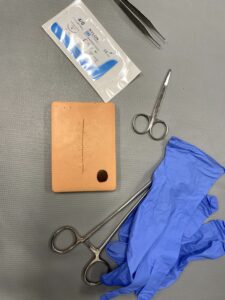
Please note, this is just my personal experience and all opinions and recommendations on this blog are my own. My opinions and recommendations do not reflect the opinions or recommendations of my employers or schools. Nothing in this article is intended as medical advice. I share all this information to share information I wish I would have known prior to my experiences. Everything on the blog is just my opinion and experiences.
***Note: Included in this post are links to some Amazon products. As an Amazon Associate I earn from qualifying purchases (at no extra cost to you), but don’t feel pressured to buy anything! I only include links to products that I have tried or would use myself.
My Surgery Rotation Experience
My surgery rotation was my first rotation and in all honesty, I was really terrified before starting the rotation. I had heard terrible things about surgery rotations and I had never been in an OR before. However, surgery really surprised me. I was surprised that not only did I tolerate it, but I actually really liked it. I liked how hands-on it is and how you can see immediate results. I learned so incredibly much on my surgical rotation. Although at this point I don’t plan on working in surgery, I feel that I learned things that will help me in whatever specialty I work in.
My surgery rotation was primarily with general surgeons, although I did get the opportunity to see some neurosurgeries, plastic surgeries, and bariatric surgeries. I also worked with lots of wound care patients, long term wound management, and outpatient post-op follow-up. However, the majority of my surgical rotation was general surgery with tons of cholecystectomies and appendectomies. I was also in the OR in my OBGYN rotation and it was definitely a different experience than my surgical rotation.
I was really lucky in that the hours of my surgical rotation were really favorable. There were a lot of early mornings and some late nights, but overall I was happy with the hours. Some of my classmates were not so lucky and had really long terrible hours. It really is dependent on the hospital and surgeon on what hours you will get.
The hospital you are at will also determine what types of surgeries you will see. Some hospitals do a ton of orthopedic procedures or cardiothoracic procedures, so you may end up seeing more of those types of surgeries compared to general surgery.
Overall, I thought my surgery rotation was really valuable and is valuable for all PA students, even if you don’t plan on doing surgery.
Things to review before your surgery rotation
****Note: there will be more things to review once you start and learn what type of surgery setting you will be in, but these are mainly geared towards general surgery and what you should know regardless of what surgical area your rotation is in.
- Rules surrounding the surgical field
- Knot-tying
- Suturing
- Different wound closures
- Pain management
- Electrolyte abnormalities and causes
- IV fluid differences (and why some are more used versus others in surgery)
- In general gastrointestinal conditions, imaging, and testing
- Differentials for acute abdomen
- Hernias
- Pre-op management (how long to be NPO, are antibiotics needed, etc)
- Antibiotics for pre-op, intra-op, and post-op
- Contraindications to surgery
- Surgical care (pre/intra/post-op) for patients with comorbidities (diabetes, hypertension, obesity, etc)
- Allergies to be aware of during surgery
- Pre-op clearance for surgery
- Causes of Post-op fever (I like the 5 w’s acronym: wind, water, walking, wound, wonder drug)
- Pain management post-op
Tips for while on your surgery rotation
***When writing this, I found that I had a lot more tips than I realized, so sorry if this section is quite long haha.
Ask questions when given the opportunity
Surgery can be a really busy rotation with the surgeon or residents you are with having very little time for you. You may not always have the opportunity to ask a question, but write any questions you have down (if you can) to save them for later, either to look up or ask. Sometimes you may not have any opportunity to ask questions, but still find the answers to your questions by looking up the answer later at home. Asking questions (to your preceptor or even just the books) and learning the answer will help you learn so much.
Observe and learn, even if you think you never want to do surgery
Even if you don’t plan on going into surgery, go into it with the attitude to learn. Even if you never plan to step in an OR again, you will learn a lot from your surgery rotation. Many of your future patients will experience a surgery at some point and understanding pre- and post-op along with certain things that happen in surgery can help you to better help your future patients. Also, you may end up liking surgery better than you thought and would consider working in surgery in the future.
If you get queasy, try to prepare beforehand and discuss with your preceptor if it is a concern
There are several things that you can do to prepare for surgery if you are worried about feeling queasy during the rotation. Prior to the rotation, try to desensitize yourself to the OR and prepare yourself as much as possible. The less things are unfamiliar to you when you enter the OR the first time, the less anxiety you will have when you enter the OR for the first time. I hope to have an entire post on this in the future, but for now, here are some things you can do:
- Watch YouTube videos of surgeries at home in a safe place (like on your couch). You can take breaks when you need to and be in a comfortable position.
- While you’re watching the videos, try to think of it objectively and pay attention all of the little detailed things happening
- Find relaxation techniques that work for you. I have tried a bajillion different ones, but I prefer the 54321 technique and box breathing
- Stay super hydrated and eat something before. Since surgeries are early in the morning, it can be tempting to skip breakfast, but even just something small like a granola bar can be good to eat beforehand.
- While in the OR (hopefully you’ve prepared by watching some YouTube videos), remember to breathe, remember that you can step out if you need to, remember you can look away and focus on something else (if you are just observing).
- If you are in the OR and start to feel queasy, do something about it. The team doesn’t need a second patient (you) in the room, so tell someone, sit down, or step out if you need to.
- Don’t be embarrassed if you feel queasy, you are not the first and definitely not the last to feel this way.
Take every opportunity given to you
As I talked about previously, surgical rotations really vary between students. This is due to so many factors including your location (big city hospital or rural country hospital), the surgeon you’re with, the size of the surgical team, and surgical specialty. Use the opportunities that you are given, even if they aren’t opportunities that you expected. For example, there was a lot more long-term wound care that I saw on my surgical rotation than I expected. You may see things you don’t expect and take advantage of those opportunities so that you can learn as much as possible. Some rotations may have a lot of opportunities and others fewer, but regardless take any and every opportunity you are given.
Get to know the surgical staff and be kind to everyone
As in anywhere in healthcare (and life), be kind to everyone. Everyone plays a role in the care of the patient and everyone is crucial. The surgical staff do so much and there is so much you can learn from them. You may be interacting more with the surgical staff than the actual surgeon depending on your rotation circumstances. I learned a ton from the scrub techs and OR nurses around me and you can learn from them too. Also anesthesiology has a lot to teach too if they are willing and you are ready to listen. I learned so much about airways from one of the anesthesiologists I frequently encountered in the OR.
Help out the surgical team when possible
If you are able and it would be helpful to the care team, help position the patient and help the team get the room and patient ready for surgery. This is not always possible depending on the hospital and team, but if is is possible always be as helpful as you can. Ask your surgical team if there is anything you can do to help out, even if it is as simple as moving the empty gurney out of the room after the patient is positioned on the table. Being helpful goes a long way and does help the patient.
If you get the opportunity to scrub in, talk to the scrub tech prior
It really depends on your surgeon and rotation if you will be scrubbing in every surgery or only some surgeries, but whenever that happens, talk to the scrub tech and staff prior to the surgery. They may already have extra gowns and gloves prepared or they may have you bring your gown and gloves to them prior to scrubbing. They will be helping you gown and glove, so they may also have other feedback or advice for you, especially if it is your first time working with them.
Things to have in your pocket during your Surgery Rotation
- Small pocket notebook — Always have a notebook to write notes for yourself of things you learned, things you need to study or research more, or diagnoses log (if you need to do that for your school). I prefer ones with pages that don’t rip out like this one, but any will do. Folded computer paper also works in a pinch.
- Pens – Any pen will do, but I recommend a pen that is unique if you don’t want to lose it (aka someone taking it). I used the same 2 pens (black and red from MUJI) for almost all of my rotations, just because they looked a little different and for this no one accidentally took them. Regardless, it is good to have more than one with you in case you find yourself without one.
- Anything your preceptor asks you to have with you – In my case this was extra patient consent sheets. The surgeon I was with liked me to have extra blank patient consent sheets so that if he needed one while in a patient room and he could go over the procedure with the patient there. This really depends on hospital and surgeon, but if they ask you to have something with you, make sure that you have it.
- Hair tie if you have long hair – Your hair must be back and out of the way at all times. If you don’t wear a cloth scrub cap, the netting cap that you can wear is quite small so if you have long hair, make sure that it is secured in a way that won’t pull off the netting cap. I learned this lesson the hard way when my cap was pulled off by my heavy braided hair; from then on I wore my hair in a low bun so that it wouldn’t pull on my cap.
- Silicone ring or nothing (leave jewelry at home) – Leave your jewelry at home, but if you insist on wearing a wedding ring (that will still be taken off when scrubbing and in surgery), wear a rubber one so that you don’t lose your real one.
- Hospital ID – Make sure that you have all the proper identification that you need. The surgical unit is often very locked down and will require special access, so make sure you are prepared with everything you need to access the area.
- Penlight – Penlight is always good to have while evaluating patients outside of the OR.
- Scrub cap (depends on rotation)- Some students want to have their own scrub caps in surgery, but I would recommend against buying one before your rotation starts. Some hospitals have strong policies on this while others allow them for students (with rules). So I would plan on using the disposable ones provided by the hospital unless the cloth ones are approved for students by your hospital or surgical team.
- Surgery shoes — This is another thing that I believe the policies change between hospitals. Some require special shoes while some just require shoe covers. Some surgeries are really messy (like ortho surgeries), so specific OR shoes are good to have. I used Crocs clogs and they worked well for me.
Study Materials to Use for your Surgery Rotation
- Rosh Review – Rosh questions were so helpful in preparing for the end-of-rotation exam and for evaluating what I needed to study better. I used Rosh for the entirety of my rotations and thought that it was well worth the investment.
- Dr. Pestana’s Surgery Notes Book – This book has great practice questions and important info for differentiating between conditions. I definitely wouldn’t use it as your only way of studying though.
- First Line Guide – This is the review book that I used for every rotation and PANCE prep.
- PANCE Prep Pearls – PANCE Prep Pearls is a classic resource used by PA students everywhere. I honestly prefer First Line Guide (above) in just about everything, but PANCE Prep Pearls has some useful charts that condenses the information well.
- LANGE Physician Assistant Examination Q+A -While this is a book that I only got near the end of my program while studying for the PANCE, I wish that I had it earlier. After studying each of the conditions on the blueprint, doing practice questions was really helpful to me in evaluating what I needed to study more about. I since have used it when tutoring students in rotations.
- Epocrates – There is a free version and paid version. In school I used the free version and liked it. You can see all information about every medication on the market, including dosing and indications.
- Family Practice Notebook (online)– Even though this is family practice based, it is a great FREE resource for reviewing GI conditions, labs, and treatments.
Overall, these are all my tips for a surgery rotation in PA school based on my experience. It is hard to condense 2 months into a few words, so if I missed anything or you have any questions, please let me know!
If you need tutoring while in PA school, I offer tutoring on an online platform. Feel free to contact me on the tutoring platform I use if you are interested in any tutoring sessions!
Thanks for reading!
-Liz
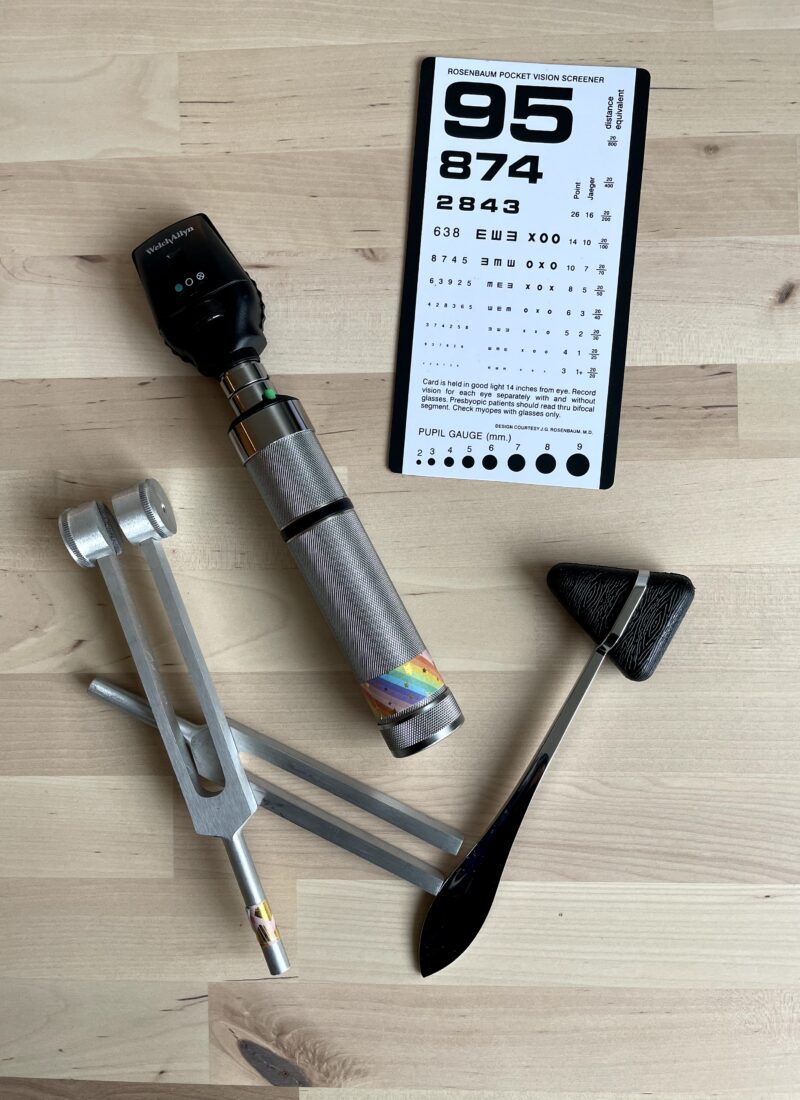
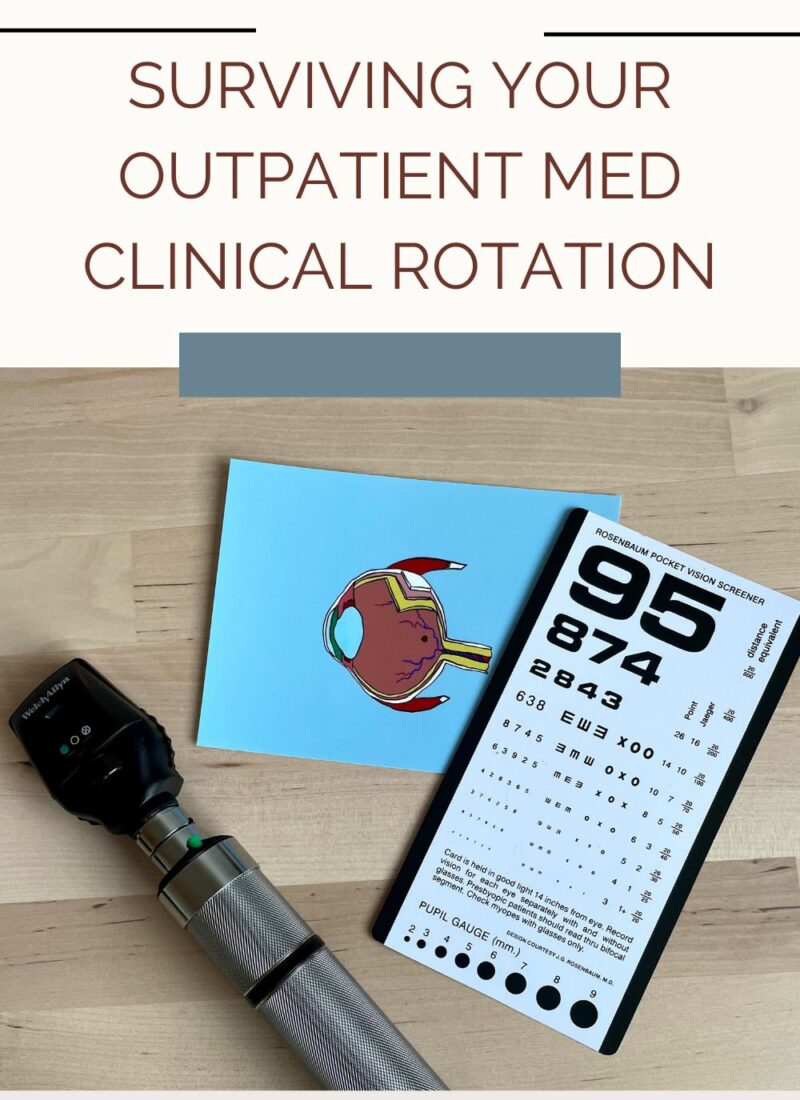
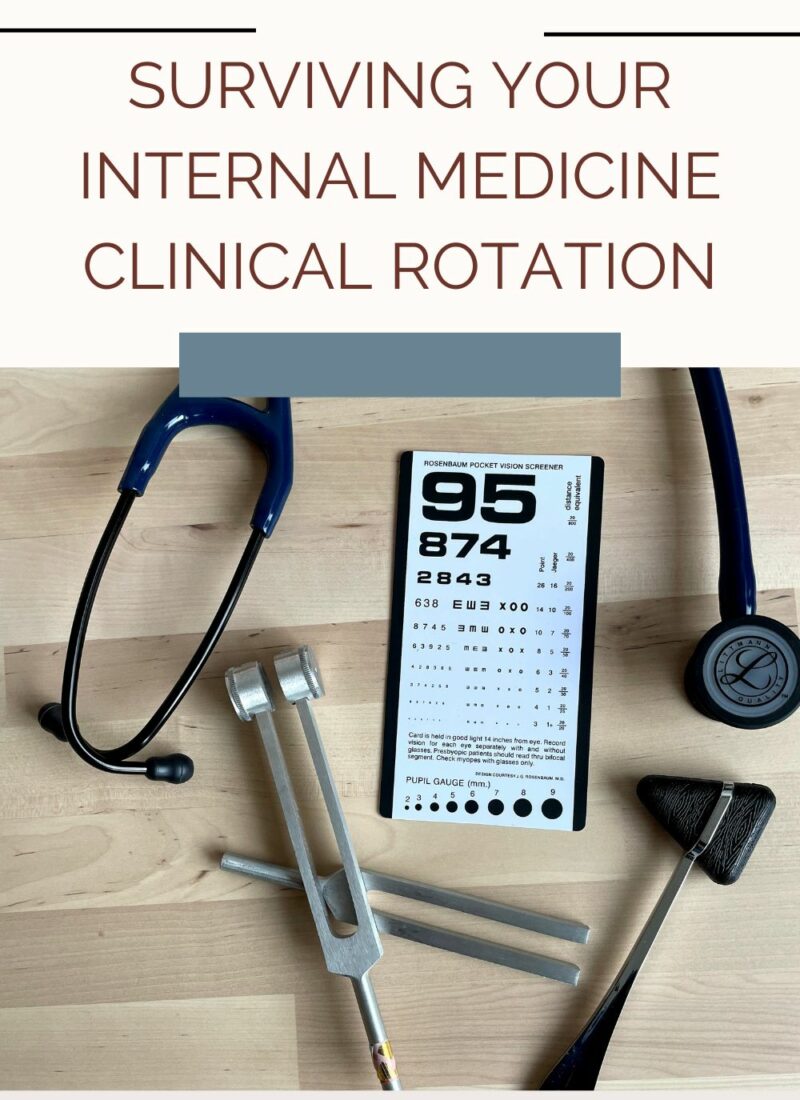
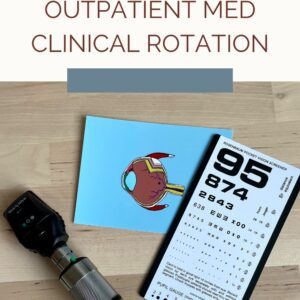
Leave a Reply